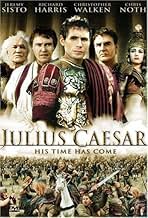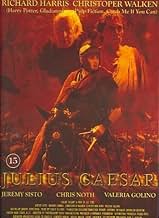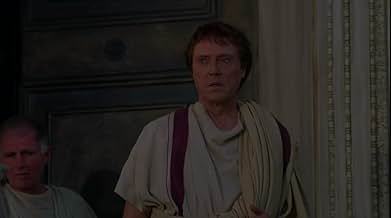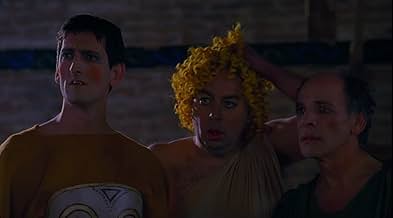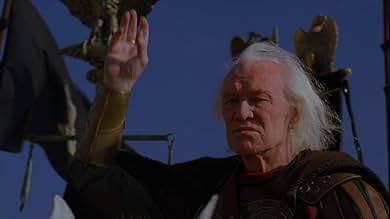Julio César, de veinte años, huye de Roma para salvar su vida durante el reinado de Sula, pero gracias a su destreza y ambición se convierte cuatro décadas más tarde en el dictador supremo d... Leer todoJulio César, de veinte años, huye de Roma para salvar su vida durante el reinado de Sula, pero gracias a su destreza y ambición se convierte cuatro décadas más tarde en el dictador supremo de Roma.Julio César, de veinte años, huye de Roma para salvar su vida durante el reinado de Sula, pero gracias a su destreza y ambición se convierte cuatro décadas más tarde en el dictador supremo de Roma.
- Nominado a 2 premios Primetime Emmy
- 1 premio ganado y 5 nominaciones en total
Opiniones destacadas
Well, I have to say, I didn't like the first part much until Vercingetorix showed up. The historical facts were severely mutilated, although the costumes and scenery looked fine and the actors did good jobs. Then came the Gaul's leader. In my opinion Vercingetorix was the best part in the script, well written and impressively acted by Heino Ferch. I hadn't cared much for the other characters, but the wild haired and heavily tattooed Gaul (a big thank you to the make up department) broke the ice. When he appeared, the story suddenly got some interesting action. I cared for him, although I knew he would have to die in the end.
The second part then was better, there was more tension building up and the Ides of March were dawning. The inevitable murder of Caesar was well choreographed, I only missed Marc Anthony's speech at Caesar's funeral. Jeremy Sisto's performance was okay, he changed believably from young father to older dictator. The supporting cast, consisting of excellent actors from different countries, worked together as a convincing ensemble, yet some actors (Sean Pertwee for instance) hadn't enough screen time to show their normal acting talent. Pity.
I can recommend this mini series to everybody who loves action scenes with lots of Roman soldiers and definitely to fans of Heino Ferch. My rate: 8 out of 10.
Secondly, there is a grave error in the summary: Brutus is NOT the nephew of Caesar but of Cato. Caesar had a very famous grand nephew named Gaius Octavian, aka Emperor Augustus, who is not depicted in the film but mentioned in the end credits.
I think it is OK for TV movie, but like most Roman films the "liberties" with historical facts annoys me. Still, it is far more correct than most of its ilk. A bit rushed at times, but fairly entertaining if you're into roman history.
But the good point is the honest job of the actors. And the Ides of Mars . But nothing more or else or promising. Sure, I understand the desire of Udi Edel to meke a film about Julius Caesar. I do not understand the resulted massacre. Because the subject is real generouse. Because the death of Caesar seems a sort of punch in stomach. Too early, too forced. Because the make up, against good intentions, is awful. Because the actor deserve better dialogues and stronger roles. But , sure, it is a try. Not convincing, maybe reasonable for part of public.
also to clarify another reviewer's comments; Cato was Brutus's uncle. he--Cato--shared a mother with Servillia, the mother of Brutus. she was the sister of Livius Drusus, the tribune of the plebeians who was assassinated around 108. her original husband, Caepio father of Servillia, was killed in the east. she then took up with M. Porcius Cato's father. according to Plutarch, Sulla died after having relinquished the office of dictator and retired to the countryside to spend the end of his days in total debauchery.
also missing from the film is Crassus and Cicero. to omit these characters is akin to omitting w.t. Sherman and Jefferson Davis from any story about the civil war. as a result the movie is careless in its regard for history. one of the early scenes in the movie involving the pirates is so ignorant of history as to make the viewer throw up their hands in disgust and say 'why was the primary text ignored?' the story of Caesar and the pirates is one of the best stories of his life and it was not given any justice. if one would be interested in roman history i strongly suggest reading up on the harrowing tale of Caesar and the pirates. in the end this movie was in terms of historical accuracy below even the HBO series Rome which was also fairly free in its interpretation of roman history but much more entertaining.
So this pulled a lot of things together for me, as history. If I had a problem with it, it was that I had a tough time keeping the characters straight. They weren't frequently enough called by name. And since most of the faces were unfamiliar the problem was even more acute.
I did recognize Richard Harris, looking absolutely GREAT in his last film role, all white and withered and glowing with inner strength and with nastiness. And Chris Noth I recognized from the early episodes of "Law and Order." He did pretty well as Pompeii, although his speech had a Brit accent that tended to come and go. Christopher Walken was both recognizable and rememberable as Cato. He's a surprisingly versatile actor. Valeria Golena was also a familiar face as Calpurnia, Caesar's second wife. (I never knew he had a first one. See what I mean?) And -- triumph of all triumphs -- I finally learned how to pronounce the name of Vercingetorix, the Arverni chieftain who led the Gauls. Speaking of him -- VercinGETorix, that is -- the actor who plays him, and whose name I don't have the opportunity to look up at the moment, gives what is for me the best performance in the movie. He is a brave, self-sacrificing, and dignified man (for a Barbarian) and the actor captures all these attributes, and has a sympatico face to boot, though by no means a handsome one. As portrayed here, if he had just been born in Gaul two millenia later, I could visualize him in an inexpensive suit dining on medallions of beef in some unpretentious bistro, with a glass of Château Neuf du Pape, using the continental knife and fork technique. As it is, he gets his head lopped off.
The story is a little confusing though. I suppose you can't stuff all of Caesar's life story into a few hours. But I missed the final confrontation between Caesar's outnumbered army and Pompey's in Egypt. We see Caesar leaving Rome with a determined expression, and the next thing we know he and his men are in Pompey's tent at Pharsalus. We are also told that Pompey's head was chopped off by the Egyptians at Alexandria, whereas some sources claim it was done by traitors among Pompey's men. It is also not entirely clear to me why some of these guys are considered military geniuses. We only get to see a single map. Pompey leaves Rome early in Part I and returns a hero. Okay. What did he do that was so hot? And we see Caesar defeat a horde of Gauls. He must have done more than that, but what? A few more maps, or exposition in some other form, however clumsy, might have helped.
It's also not made clear enough that Caesar committed an illegal act, a surprise for a guy who is shown to be so fair and compassionate and, if not exactly self-effacing, at least no egomaniac. Rome was a Republic, ruled by the Senate. It was governed by laws. The Senate ordered Caesar to disband his army and return to Rome or else be declared a traitor. By Roman law no general could bring his forces into Italy proper without the consent of the Senate. The border of Italy was the Rubicon and Caesar took his legions across it in defiance of the Senate, saying, "The die is cast." Hearing this, Pompey and some of the Senate took off for friendlier climes because Caesar by this time had a huge force with him. When he entered Rome, what was left of the Senate appointed him dictator. End of the Republic. That wasn't very nice, was it?
Oh, and another thing -- I always thought that when a Roman general returned from a victory, trailing prisoners and booty, a slave stood beside him in the chariot whispering to him, "Remember, thou art mortal," just so he didn't get any ideas like Caesar did.
I wish some of the performances had been better. Many of them are pretty weak, Mark Antony in particular. And Brutus seems too young for the part, and he's the one who looks "sicklied o'er with the pale cast of thought." In fact, he really IS pale and sweaty and a nervous wreck.
The Roman Empire finally fell apart, as everyone knows, but as it split up, there were still a lot of leaders or would-be leaders claiming direct descent from Gaius Julius Caesar. They were with us until just recently. The Tsar (or Czar) of Russia bore the title of Caesar, which is where the Russian word comes from. In Germany, "Caesar" became Kaiser, as in Kaiser Wilhelm.
Too bad we didn't get more of Caesar's accomplishments, or a better look at his weaknesses -- after all, he allowed himself to be appointed dictator without trying to reconstitute the Senate -- and there was that business with Cleopatra, a political opportunist if there ever was one. Still, it's worth watching. It's an interesting historical tale.
¿Sabías que…?
- TriviaFinal film or television appearance of actor Richard Harris.
- ErroresSulla did not die as dictator of Rome. He resigned his position in 80 B.C., two years before his death in 78 B.C. He died a slow death from liver failure while writing his memoirs, not from a sudden heart attack.
- Citas
Aurelia: If you marry Cinna's daughter you will be identified with the popular party whether you wish or not.
Caesar: I wish it.
Aurelia: They are not our people.
Cousin: You wish to join with farmers and hagglers and beggars?
Caesar: Our family itself did not exactly drop straight out of Jupiter's ass.
- ConexionesFeatured in Julius Caesar: Featurette (2004)
Selecciones populares
- How many seasons does Caesar have?Con tecnología de Alexa
Detalles
- Fecha de lanzamiento
- Países de origen
- Sitios oficiales
- Idioma
- También se conoce como
- Caesar
- Locaciones de filmación
- Malta(setting: City of Rome)
- Productoras
- Ver más créditos de la compañía en IMDbPro
Contribuir a esta página



